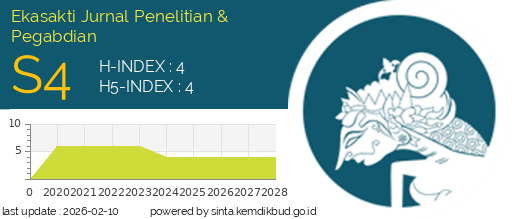Musik Sebagai Media Komunikasi Bagi Kesehatan Mental
DOI:
https://doi.org/10.31933/ejpp.v5i2.1317Keywords:
Music, Communication, Mental Health, Music TherapyAbstract
Mental health is a crucial aspect of maintaining life balance, particularly amidst increasing social pressures and the complexities of modern life. Numerous studies have shown that music is not merely a form of entertainment but also possesses significant therapeutic functions. As a form of non-verbal communication, music enables emotional expression, stress reduction, and provides a medium for self-expression that cannot be easily conveyed through spoken language. This study employs a qualitative method with a descriptive case study approach involving eight housewives in the Pasar Gaung area, Padang City. Data were collected through in-depth interviews, observation, and documentation, and analyzed using Rational Emotive Behavior Therapy (REBT) and music communication concepts. The findings reveal that music is effective in regulating emotions, transforming negative feelings, and fostering motivation and creativity. Moreover, music serves as a universal medium of communication that builds social connectedness and offers psychological support. Therefore, music can be considered an essential coping mechanism and a valuable therapeutic resource for enhancing mental well-being.
References
Boer, D. & Abubakar, A., 2014, Music listening in families and peer groups: Benefits for young people’s social cohesion and emotional well-being across four cultures, Frontiers in Psychology, Vol. 5,
Bunt, L. & Stige, B., 2014, Music Therapy: An Art Beyond Words, Routledge, London,
Carr, C., Odell-Miller, H. & Priebe, S., 2017, A systematic review of music therapy practice and outcomes with acute adult psychiatric in-patients, PLoS ONE, Vol. 12(8),
Chanda, M. L. & Levitin, D. J., 2013, The neurochemistry of music, Trends in Cognitive Sciences, Vol. 17(4),
DeNora, T., 2000, Music in Everyday Life, Cambridge University Press, Cambridge,
Ellis, A., 2001, Overcoming Destructive Beliefs, Feelings, and Behaviors: New Directions for Rational Emotive Behavior Therapy, Prometheus Books, New York,
Esterberg, K. G., 2002, Qualitative Methods in Social Research, McGraw-Hill, Boston,
Hallam, S., 2010, The power of music: Its impact on the intellectual, social and personal development of children and young people, International Journal of Music Education, Vol. 28(3),
Huron, D., 2006, Sweet Anticipation: Music and the Psychology of Expectation, MIT Press, Cambridge,
Juslin, P. N. & Sloboda, J. A. (eds.), 2010, Handbook of Music and Emotion: Theory, Research, Applications, Oxford University Press, Oxford,
Juslin, P. N. & Västfjäll, D., 2008, Emotional responses to music: The need to consider underlying mechanisms, Behavioral and Brain Sciences, Vol. 31,
Koelsch, S., 2010, Towards a neural basis of music-evoked emotions, Trends in Cognitive Sciences, Vol. 14(3),
Miles, M. B. & Huberman, A. M., 1994, Qualitative Data Analysis: An Expanded Sourcebook, Sage Publications, London,
Moleong, L. J., 2017, Metodologi Penelitian Kualitatif, PT Remaja Rosdakarya, Bandung,
Nazir, M., 2014, Metode Penelitian, Ghalia Indonesia, Bogor,
Schäfer, T., Sedlmeier, P. & Huron, D., 2013, The psychological functions of music listening, Frontiers in Psychology, Vol. 4,
Sloboda, J. A., 2005, Exploring the Musical Mind: Cognition, Emotion, Ability, Function, Oxford University Press, Oxford,
Spradley, J. P., 1997, Participant Observation, Waveland Press, Illinois,
Stige, B., 2002, Culture-Centered Music Therapy, Barcelona Publishers, Gilsum,
Sugiyono, 2016, Metode Penelitian Kualitatif, Kuantitatif dan R&D, Alfabeta, Bandung,
Thoma, M. V., Scholz, U., Ehlert, U. & Nater, U. M., 2013, Listening to music and physiological and psychological functioning: The mediating role of emotion regulation and stress reduction, Psychology & Health, Vol. 28(3),
World Health Organization (WHO), 2001, Mental Health: Strengthening Mental Health Promotion, WHO, Geneva,
Downloads
Published
How to Cite
Issue
Section
License
Copyright (c) 2025 Rahmad Surya, Fetri Reni, Zumiarti, Riswanto Bakhtiar, A.A Dzaky Zaidan

This work is licensed under a Creative Commons Attribution 4.0 International License.
Penulis yang mempublikasikan manuskripnya di jurnal ini menyetujui ketentuan berikut:
- Hak cipta pada setiap artikel adalah milik penulis.
- Penulis mengakui bahwa Ekasakti Jurnal Penelitian & Pegabdian (EJPP) berhak menjadi yang pertama menerbitkan dengan lisensi Creative Commons Attribution 4.0 International (Attribution 4.0 International (CC BY 4.0) .
- Penulis dapat mengirimkan artikel secara terpisah, mengatur distribusi non-eksklusif manuskrip yang telah diterbitkan dalam jurnal ini ke versi lain (misalnya, dikirim ke repositori institusi penulis, publikasi ke dalam buku, dll.), dengan mengakui bahwa manuskrip telah diterbitkan pertama kali di Ekasakti Jurnal Penelitian & Pegabdian (EJPP).












